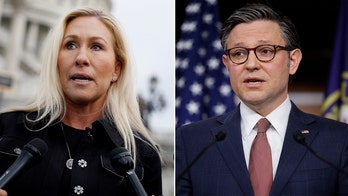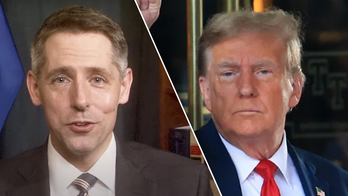Republican Scrap on Spending
“Let’s call it a good starting point. But there’s no reason we shouldn’t be able to double that.”
-- An aide to a freshman Republican House member to Power Play discussing the proposed $35 billion in cuts for the last seven months of the fiscal year.
House Republican freshmen are fired up and looking for dramatically deeper cuts to current spending levels than those currently on offer from party elders.
Democrats are pretty excited too, because they believe that the long-predicted Tea Party crackup inside the Republican caucus has finally arrived. Following three failed GOP legislative maneuvers on other issues and now the fracas over budget cuts, the House minority is gleeful at the thought that civil war has come to the new majority.
Longtime Republican House members are quietly grumbling that this kind of public friction is the inevitable result of Speaker John Boehner’s insistence on open operations and inclusiveness.
The three botched bills –- one on extending provisions of the Patriot Act, another on some kind of government subsidy for workers displaced by imported products and a third on clawing back part of the U.S. contribution to the U.N. – were held up as evidence that the new team was in over its head. That they came as a member of the GOP caucus resigned in disgrace for seeking illicit internet lovers under an assumed identity was seen as further proof in establishment Washington that a Republican flameout could be afoot.
One lobbyist and former Hill aide who works closely with senior members of the House GOP told Power Play that the old bulls are restless.
“They’re much more comfortable with a top down approach. They liked the way [former Majority Leader Tom] DeLay did it. They respected the way [former Speaker Nancy] Pelosi operated,” the lobbyist said. “They don’t like change and they are seeing proof that change is bad.”
Boehner admitted Wednesday morning that things weren’t going smoothly, but neither did he seem inclined to anxiety.
“We have been in the majority four weeks,” Boehner told reporters. “We are not going to be perfect every day.”
What’s happening now is an internal negotiation among Republicans on current spending levels.
The senior members spoke first. Budget Chairman Paul Ryan, R-Wisc. last week laid down a marker for taking $35 billion off of current spending levels. On Wednesday, Appropriations Chairman Hal Rogers, R-Ky., outlined some of the programs that would be cut to pay for the plan – like eliminating the Americorps program and subsidies for Planned Parenthood and deep reductions for the EPA, the Department of Labor and other agencies.
But that is just the beginning. If current levels were extended until the end of the current fiscal year in September, the government would spend about $1.09 trillion. To make good on the party’s Pledge to America, Republicans need to roll back spending by $58 billion. That’s where the freshmen come in.
Spending measures are traditionally brewed up behind closed doors and then brought out in tightly controlled votes that prevent much debate. What Boehner and Majority Leader Eric Cantor are going to do defies that convention. They will bring the initial spending bill out and leave it open to amendments.
Tea Partiers and freshmen will have the chance to propose any further cuts they want when the spending plan comes to the floor. If they want a cut, they can propose it. Some have plans for far deeper reductions than the $58 billion target, some want less. So Boehner and his team will let them debate and vote.
The baseline proposal will be introduced next week and the debate will likely take many, many days. It could be sped up if leaders can agree on deeper cuts in the starting proposal in response to complaints from fiscal hawks, but no matter what, the process will not be speedy. And remember too that what House Republicans (and some Blue Dog Democrats) agree to still has to head to the Democratic Senate for approval.
It looks increasingly likely that there will have to be some kind of stopgap spending measure to fund the government as the debate goes on. The current spending provision passed in the lame-duck session funds the government to March 4, by which point final agreement seems unlikely.
What that means is that the debate over current spending will collide with the debate over 2012 spending and the request from President Obama for an increase in the federal debt limit. Obama’s proposed budget for the next fiscal year will be out on Monday and the Treasury Department forecasts that the government could run out of credit as soon as the end of March.
Feisty freshmen, anxious old Republicans, cackling Democrats – it’s a heady mix in the House these days. But the new Republican leadership so far is steaming ahead and betting that the process will produce the right results.
“It’s a positive debate amongst the conference that will result in real cuts,” one senior aide told Power Play. “We'll all come together.”
Flash Crash For Craigslist Congressman
"… responding to what may seem like a friendly e-mail or an appealing marketing offer can have serious consequences. Private information and images can so easily be transmitted to friends and strangers alike."
-- Then-Congressman Christopher Lee, R-N.Y., writing for the Tonawanda (N.Y.) News in June 2009 about avoiding online fraud and identity theft.
The lesson of the Clinton impeachment to Washington was that almost any scandal is survivable if you don’t let your own dignity get the better of you. President Bill Clinton survived revelations of having sex (or something like it) with a 21-year-old intern in his office, got caught lying about it and was impeached for the offense, but never gave any ground on the issue in the yearlong ordeal.
Two-term Rep. Christopher Lee, R-N.Y., who represented suburban Buffalo and Rochester apparently did not take that lesson.
Once the gossip Web site Gawker posted the emails and shirtless self-portrait the married congressman sent to a lovelorn lady he met on Craigslist, Washington braced for at least several days of denials and drama. But it took only two-and-a-half hours from revelation to resignation – as one aide told FOX News colleague Chad Pergram “a land-speed record” for scandal resolution.
Contrast Lee’s speedy demise to that of last year’s scandal with Eric Massa, the Democrat from the adjacent district. Massa faced the more serious charge of making unwanted sexual advances toward his male subordinates rather than the plain-vanilla, heterosexual internet cheating of Lee. Even so, Massa hung on for a month after the charges were made to Democratic leaders and made a vigorous public defense of his “salty language” and penchant for tickle fights.
But that is not John Boehner’s House. Republican members all understand that there is no tolerance for sex scandal and that those who do wrong are expected to excuse themselves from the caucus. Team Boehner is not interested in answering the kinds of questions that were asked of Nancy Pelosi during the Massa mess or of Speaker Dennis Hastert during the Mark Foley page sexting scandal of 2006.
The first sex scandal during Boehner’s tenure as GOP leader came in May 2009 from former Indiana Rep. Mark Souder, who made arrangements to resign the same day he admitted to the affair when confronted by a staffer, but lingered on in office for another week while he made arrangements for his staff and state officials arranged for his replacement. Lee, though, was gone before the close of business.
Neither was there any of Souder’s public statements of shame. Just a letter to Boehner – I’m sorry. I quit.
It seemed almost antique – neither Clintonian dissembling nor Souder-like over sharing -- just a simple, quiet and swift response to public humiliation.
It’s now up to New York Democratic Gov. Andrew Cuomo to set a date for a replacement election in the heavily Republican district, which was once represented by former party bigwig Tom Reynolds.
The big winner of the scandal: Democratic National Committee Chairman Tim Kaine.
The main story of the day before Lee blew up was the announcement from Sen. Jim Webb, D-Va., that he would not seek reelection. That’s bad news for Democrats in their bid to hold on to the seat in Kaine’s highly competitive home state and it immediately puts pressure on Kaine to leave his post and run for the seat in what would be a bruising contest with former Sen. George Allen.
Lee’s sudden collapse distracted media attention and will give Kaine time to maneuver.
Obama Ponders Options With Egypt Ablaze Ahead of Friday Showdown
"We are hoping that the 'Friday of Martyrs' will be the world largest funeral to bid farewell to 300 Egyptians.”
-- Google executive and Egyptian opposition leader Wael Ghonim in a Tweet calling for mass demonstrations.
The Obama administration reacted to the surprise uprising in Egypt on Jan. 25 with calls for a transition from the regime of President Hosni Mubarak “now” and even “yesterday.” But, as it became clear that Mubarak had no intention of jumping out, the threat of an Islamist takeover loomed large and the Egyptian military quelled battles between pro-government and anti-government mobs, the Obama team softened its stance on Mubarak.
The reasoning went that if Mubarak’s regime was indeed holding discussions with dissidents and the violence had stopped, perhaps the U.S. should not be calling for any drastic moves. Perhaps a balance could be found between reform and stability.
That new stance will be sorely tested on Friday.
Egypt today saw strikes across the country – including at the all-important Suez Canal – and clashes between protesters and police far beyond the central square of Cairo. The revolt has spread widely and with the brutal national police taking a deliberately low profile, Egyptians have lost some of their fear.
Now, with police stations being torched and state-run media reporters starting to defy official storylines, the patience of the ruling party is wearing thin. The country’s interior ministry is already shown signs that the forbearance of the past week may not much longer endure. The growing concern is that the clashes in the countryside may be headed to Cairo.
Opposition groups have set Friday for their showdown with the government. They refuse to take part in any discussions with Mubarak and his government. Riots flared today in Cairo beyond Tahrir Square, still under heavy guard by the army. Friday’s protest is aimed at breaking through the protective cordons and storming the city at large.
If a real revolt has begun, the Obama administration will find itself again scrambling to catch up.
Daniels’ First Big Test Comes at CPAC
“If I were to decide to do this, we would have an unbelievable letterhead.”
-- Indiana Gov. Mitch Daniels to Politico on a potential presidential run.
All of the potential Republican candidates except for Sarah Palin and Mike Huckabee will be making their case at the annual Conservative Political Action Confrence that kicks off today in Washington.
Mitt Romney, Tim Pawlenty, Newt Gingrich, Rick Santorum, John Thune, Michelle Bachmann and Haley Barbour will all be there. But the big question is about Indiana Gov. Mitch Daniels.
Daniels has been warming up to the idea of a presidential run for months, but his marquee speaking slot at the premier conservative conclave of the year was the cause of considerable controversy. Social conservative activists denounced Daniels’ inclusion because the former Bush budget boss has called for a “truce” on social issues until the current fiscal crisis is solved.
This is Daniels’ highest profile moment since he began his presidential pondering. If his speech is well received and he performs adequately in the event’s straw poll, he could be on his way to viability. If he can’t fire up the faithful (Daniels’ last year said he didn’t attend CPAC because it was “a lot of rowdyism”) the Daniels bubble may be popped even before it inflates.
But the idea of a run seems to be growing on him. He told Politico in an interview previewing his speech that he plans to decide on a White House by May.
And Now, A Word From Charles
“Guantanamo is open. Rendition is continued. Detention without trial continues. Military commissions resume. It's heartening that there is at least now national consensus and none of the harping on the left about the exaggeration of the threat.”
-- Charles Krauthammer on “Special Report with Bret Baier” discussing the shift from campaign rhetoric to administration policy on terrorism by President Obama.




